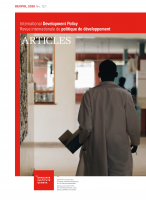Resource information
After more than ten years of hectic debates on international ‘land grabs’, academic interest in collapsed land deals or projects with unexpected results is growing. According to the Land Matrix, Tanzania is one of the target countries for such deals, with a number ‘abandoned’ or delayed and projects whose status is unknown. Labelling land deals as ‘failed’ poses conceptual and methodological challenges as long as the criteria for ‘failure’ are undefined. Based on the critical literature on policy failure, this article starts from the premise that the focus on ‘failure’ masks dynamics that actually work, such as administrative resistance and daily state making. Land deals are defined as the implementation of pro-investment land policies. The article then analyses the trajectories of two interrupted biofuel projects with international investors in the districts of Bagamoyo and Kisarawe. The results of this analysis show how the uncertainty surrounding the future of both land deals creates margins of manoeuvre for bureaucratic and political agents on different government levels to renegotiate their power, and for transnational civil society stakeholders to consolidate their positions in the land arena. The omnipresence of administrative procedures opens the debate over whether the Tanzanian regime has completed its transition towards liberalism or if it reflects its socialist legacy.

